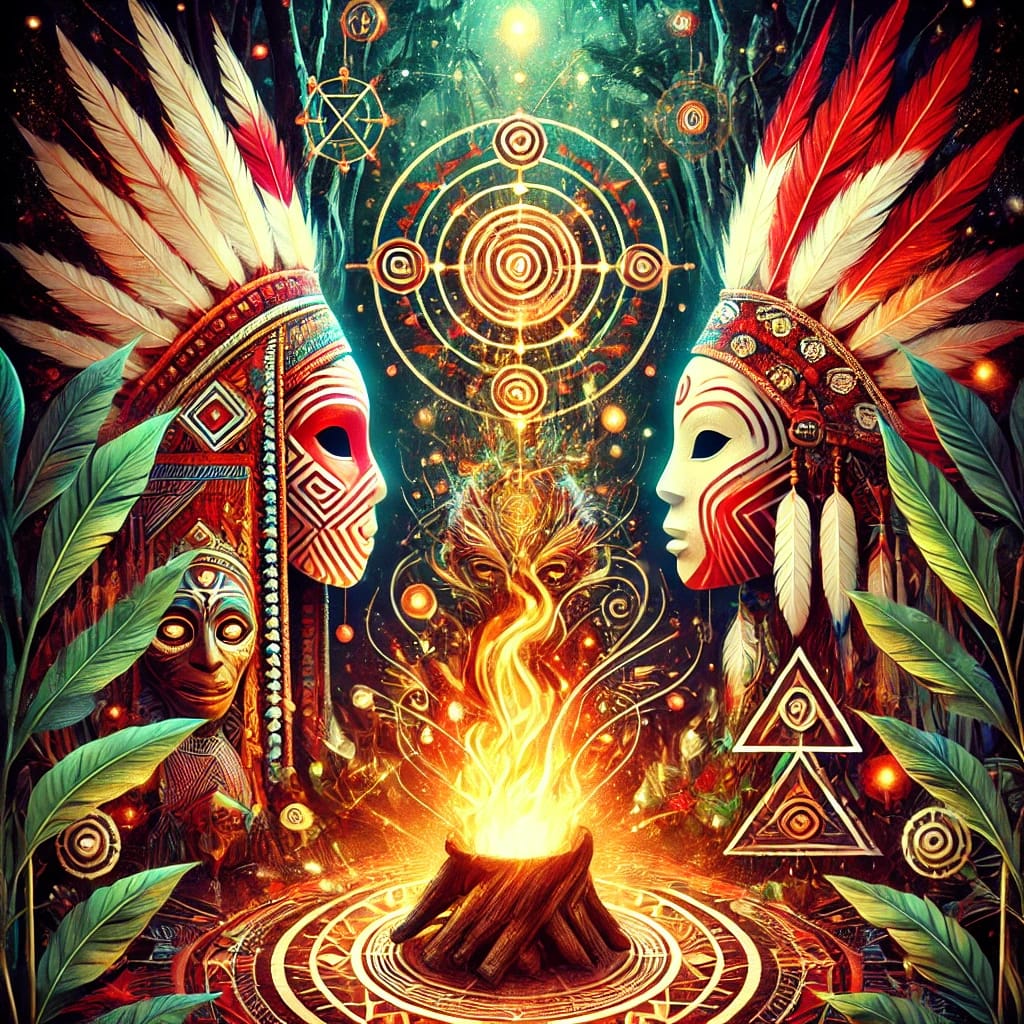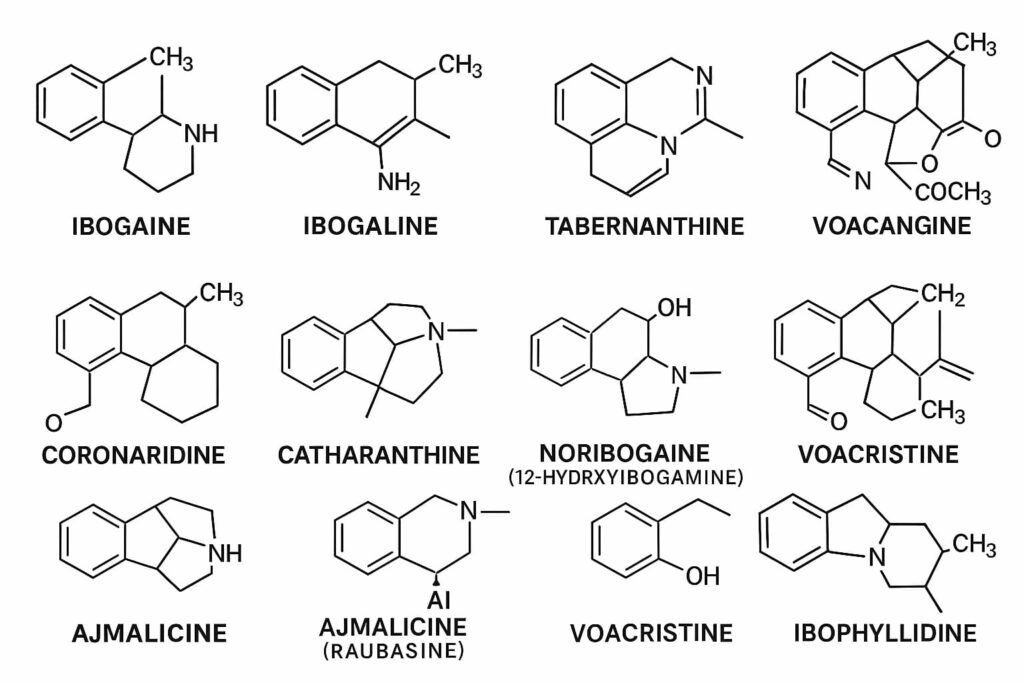What is Iboga?
Iboga is a shrub native to Central Africa, particularly found in countries like Gabon and Cameroon. Its scientific name is Tabernanthe iboga. The root bark of the iboga plant contains powerful psychoactive properties and has been used for centuries in traditional African spiritual ceremonies, especially by the Bwiti people.
Iboga is also called holy wood or wood of the spirits.The meaning of Tabernanthe Iboga is: (breaking open the head)
Iboga and Iboga Extracts
Root Bark:
The rootbark is the outer layer of the iboga root. It contains all of the active alkaloids, including 5 to 6% ibogaine. After the outer layer is removed, it is typically dried and ground before consumption. Sometimes, fresh (undried) rootbark is also used in traditional bwiti ceremonies
TA Extract (Total Alkaloid Extract):
This is a purified extract made from the root bark. It contains the full spectrum of natural alkaloids, including 50–60% ibogaine. TA extract is highly effective for treating addiction and is much easier to work with than root bark. Due to its purity, a significantly smaller dose is required compared to the raw root bark.
Pure Ibogaine (Ibogaine HCl):
This is a highly refined extract consisting of 95–98% pure ibogaine as a single alkaloid. It is often used in combination with TA extract for treating addiction, but it is also highly effective in therapeutic settings for alleviating symptoms of trauma and PTSD.

Bwiti
Bwiti is a spiritual tradition practiced primarily by the Fang, Mitsogo, and Punu peoples of Gabon, Equatorial Guinea, and Cameroon. It is a syncretic belief system that blends indigenous African spirituality with elements of Christianity and ancestor worship. Bwiti ceremonies often involve music, dance, and deep spiritual exploration, guided by initiates, healers, and shamans.
Why Do They Use Iboga?
Iboga is a sacred plant in Bwiti tradition, considered a powerful tool for spiritual enlightenment, healing, and communication with ancestors. It contains ibogaine, a psychoactive substance that induces intense visionary experiences and altered states of consciousness. The Bwiti believe that iboga allows initiates to access hidden knowledge, face their fears, and connect with the spiritual realm.
How Do They See Iboga?
Iboga is not seen as a drug but as a sacred plant teacher, a bridge between the physical and spiritual worlds. It is often referred to as the “tree of knowledge” or the “wood of the spirits” because of its ability to reveal deep truths about life, death, and existence. The plant is considered a living spirit that offers guidance, wisdom, and healing.
What Is Iboga Used For?
- Initiation Rites – Young people and spiritual seekers consume iboga to undergo a rite of passage, gaining insights about themselves and their place in the universe.
- Healing and Cleansing – It is used to cleanse the body and mind of negative energies, emotional traumas, and even physical ailments.
- Communication with Ancestors – The Bwiti believe that iboga allows them to speak with their ancestors, receive messages, and gain spiritual guidance.
- Protection and Strength – Some warriors and hunters take small doses of iboga to enhance their stamina, awareness, and intuition.
Iboga is central to Bwiti spirituality, acting as both a medicine and a portal to deeper understanding. While Western medicine has recently studied ibogaine for treatments against addiction , trauma, ptsd , burn out and much more!
For the Bwiti, the use of iboga remains ad a sacred and essential part in their way of living and spiritual identity.
The Role of Music and Dance in Bwiti Ceremonies
Music and dance are integral to Bwiti ceremonies, serving as both a form of expression and a tool for spiritual navigation. Traditional instruments such as the ngombi (harp), mougongo (monochord), and hand drums create hypnotic rhythms that guide participants through their iboga-induced journeys. Chanting, singing, and call-and-response patterns reinforce communal unity and help initiates stay connected to the physical world while exploring the spiritual realm.
The Bwiti View on Life, Death, and the Afterlife
Bwiti teachings emphasize the cyclical nature of life and the importance of understanding one’s existence beyond the material world. Iboga is seen as a key to unlocking the hidden truths of life and death, allowing initiates to confront their fears, atone for past actions, and prepare for the afterlife. The Bwiti believe that through iboga, one can receive messages from deceased ancestors, who provide wisdom and guidance for navigating life’s challenges.
Modern Challenges and Preservation of Bwiti Traditions
Despite its deep spiritual significance, Bwiti and its use of iboga face challenges in the modern world. Deforestation and overharvesting of iboga threaten its availability, while increasing global interest in ibogaine for addiction treatment has raised concerns about commercialization and cultural appropriation. Many Bwiti practitioners advocate for the protection of iboga forests and the preservation of their sacred rituals, ensuring that their spiritual heritage remains intact for future generations.

Iboga in western society
Tabernanthe Iboga is used for various therapeutic, medicinal, and spiritual purposes, particularly in the Western world, where interest in plant medicines is growing. Below are its primary applications:
- Addiction Treatment
Main use of Tabernanthe Iboga
- Treating substance dependence, particularly opioids, alcohol, and stimulants.
- Iboga interrupts addiction cycles – Ibogaine, the active compound, helps reset the brain’s reward system.
- Iboga reduces withdrawal symptoms – Users report reduced or eliminated withdrawal effects.
- Iboga iliminates cravings – Long-term reductions in drug-seeking behavior are observed.
- Iboga treats behavioral addictions – Some use it for food, sex, or gambling addictions etcetera…
- Mental Health Therapy
- Iboga is used for: Treating conditions like depression, PTSD, anxiety, and trauma.
- Iboga promotes emotional healing – Helps process deep-seated and rooted trauma on a physical and mental level
- Neuroplasticity effects – Supports brain regeneration, potentially useful for treatment-resistant depression.
- Clarity and self-awareness – Users report improved mood and emotional resilience.
- Growing interest: Some psychedelic therapy clinics are exploring ibogaine for mental health treatment.
- Spiritual & Personal Growth
Iboga is used for: Self-discovery, breaking negative thought patterns, and achieving spiritual awakening.
- Deep introspection – Users experience vivid visions and life reviews.
- Iboga breaks psychological barriers – Helps individuals confront fears and limiting beliefs
- Cognitive Enhancement & Neuroprotection
Iboga is explored for: Supporting brain health and neurodegenerative diseases.
- Iboga may promote brain repair – Studies suggest ibogaine stimulates brain-derived neurotrophic factor (BDNF).
- Ibogaine is potential against Parkinson’s and Alzheimer’s desease – Some researchers are investigating its neuroprotective effect.
- Energy , Stamina Enhancement and Microdosing
Traditional use of iboga: Some Central African cultures use iboga in small doses for endurance and focus , also microdosing of iboga in the Western world is very common and mostly done for the therapeutical benefits it has by taking small amounts of iboga that helps for cognitive and physical performance or maintenance after a flood dose
Alkaloids
Iboga (Tabernanthe iboga) contains a complex mixture of alkaloids, primarily indole alkaloids, many of which are unique to the plant. Here’s a list of the major and minor alkaloids identified in iboga root bark:

Major Alkaloids:
- Ibogaine – The most well-known and psychoactive alkaloid; primarily responsible for iboga’s hallucinogenic and anti-addictive properties.
- Ibogaline – Structurally related to ibogaine, with psychoactive potential.
- Ibogamine – Also structurally similar to ibogaine, with less potency.
- Tabernanthine – Another related compound, showing neurotrophic and psychoactive effects.
- Voacangine – A precursor to ibogaine; found in both iboga and the related plant Voacanga africana.
Minor Alkaloids:
- Coronaridine – Found in some strains of iboga, with possible anti-addictive properties.
- Catharanthine – Also found in Catharanthus roseus (Madagascar periwinkle); present in small amounts.
- Ajmalicine (Raubasine) – Known for its hypotensive (blood pressure-lowering) effects.
- Noribogaine (12-hydroxyibogamine) – A metabolite of ibogaine, pharmacologically active with a longer half-life.
- Voacristine – Present in some iboga specimens.
- Ibophyllidine – A structurally related indole alkaloid.
